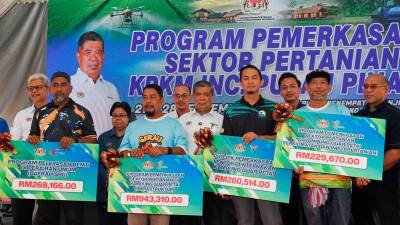TASEK GELUGOR: The Ministry of Agriculture and Food Security has allocated RM2.138 million for development projects in its four MADANI adopted villages in the Tasek Gelugor area.
Minister Datuk Seri Mohamad Sabu said the projects cover 112.3 hectares of land in Kampung Guar Petai, Kampung Labuh Banting, Kampung Tok Jawa and Kampung Baru.
He explained that one ministry typically adopts one MADANI village, but his ministry has four villages to develop with this allocation.
The allocation includes RM1.878 million for the agriculture sector and RM260,514 for the livestock farming sector.
These projects involve maintaining a 20,000-metre-long ditch and liming and levelling 150 hectares of land.
They also include constructing support infrastructure and providing modern machinery like tractors and drones.
Agricultural input assistance will help control fast-growing weed attacks known as ‘keladi agas’.
Mohamad spoke after launching the Kampung Guar Petai Agricultural Sector Empowerment Programme at the Kampung Labuh Banting Flood Relief Centre.
He said he selected these four villages because he was born and raised in this area.
He wants to continue developing these communities to bring added value to their residents.
Project implementation will increase drainage and irrigation system effectiveness.
It will reduce yield losses from pest and weed attacks and improve paddy farmer efficiency through modern mechanisation.
For the livestock subsector, ten breeders received assistance for farm infrastructure and livestock breeds.
They also received machinery, equipment and livestock feed with the RM260,514 allocation.
This assistance reduces operating costs and increases breeder competitiveness.
KPKM supports local entrepreneurial projects in the downstream industry.
Ayunis Enterprise produces ‘maruku’ with annual sales reaching RM2.5 million.
The ‘Dodol Dapur Kayu’ Project by Mohd Hafiz Ramli preserves traditional recipes with annual sales around RM100,000.
These initiatives reflect the MADANI government’s determination to strengthen Penang’s agricultural sector.
They ensure the sector remains competitive while guaranteeing the country’s food security.
Mohamad urged youths to join the agro-food sector using new technologies.
He specifically mentioned the Internet of Things, artificial intelligence, mechanisation and automation.
These technologies align with the Industrial Revolution 4.0 and will modernise the sector.
Digitalisation and modernisation will make Malaysia’s agro-food sector more competitive and resilient.
Such efforts ensure national food security while providing lucrative returns for targeted groups.
They also strengthen the socio-economy of agricultural communities. – Bernama
